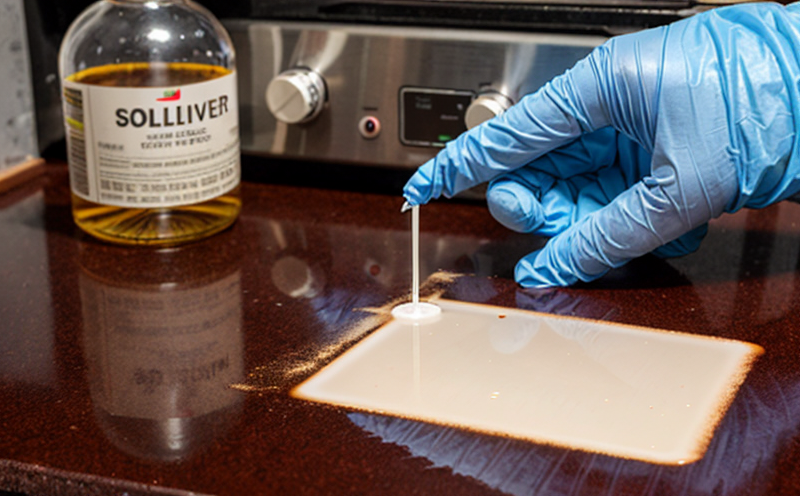Marine Sediment Solvent Residue Testing
The testing of solvent residues in marine sediment is a critical process used to ensure that environmental standards are met and to protect ecosystems from harmful pollutants. This service involves the analysis of sediments collected from various maritime environments, including ports, harbors, coastal regions, and offshore platforms. The primary objective is to identify and quantify volatile organic compounds (VOCs) and other hydrophobic chemicals that may have been introduced into the sediment due to industrial activities or accidental spills.
The process begins with sampling, where specialized equipment is used to collect representative samples of marine sediment. Once collected, these samples undergo rigorous preparation procedures to ensure they are free from external contaminants and remain stable during testing. The analytical methods employed vary depending on the specific compounds being sought but often include gas chromatography-mass spectrometry (GC-MS), high-performance liquid chromatography (HPLC), or Fourier-transform infrared spectroscopy (FTIR).
The results of this testing are crucial for regulatory compliance, environmental impact assessments, and risk management strategies. For instance, the European Union's Marine Strategy Framework Directive (2008/56/EC) mandates that member states monitor and assess the state of their marine waters to ensure they meet good environmental status by 2020. Solvent residue testing plays a vital role in achieving these goals.
Another important application is in the context of port security, where the presence of hazardous chemicals in sediments could indicate a potential threat or illegal disposal activities. The test results can also inform cleanup efforts and remediation plans, ensuring that contaminated areas are treated appropriately before they pose risks to human health or aquatic life.
It's essential to note that the choice of analytical techniques is guided by international standards such as ISO 17025 for method validation and ISO 18936 for sediment sampling. Compliance with these standards ensures accuracy, reliability, and consistency in test results across different laboratories.
- Industry Applications: Environmental monitoring, port security, compliance with environmental regulations, risk assessment, remediation planning
- Why Choose This Test: Provides critical data for regulatory compliance, supports environmental protection efforts, helps identify potential threats to ecosystems, ensures accurate and reliable results
The testing process is not only about detecting the presence of solvents but also understanding their distribution within the sediment matrix. This information is essential for developing effective mitigation strategies that address both immediate risks and long-term impacts on marine environments.
For quality managers, compliance officers, R&D engineers, and procurement professionals involved in maritime operations or environmental management, this service offers valuable insights into the ecological health of coastal regions. By leveraging advanced analytical techniques, stakeholders can make informed decisions regarding resource allocation, operational adjustments, and long-term sustainability initiatives.
Eurolab Advantages
EuroLab stands out in providing comprehensive solvent residue testing for marine sediments through its expertise, state-of-the-art facilities, and commitment to quality. Our team of experienced scientists ensures that every sample is handled with care from collection to final analysis. We utilize the latest technology available, including advanced analytical instruments capable of detecting even trace levels of solvents.
Our laboratories are accredited to ISO 17025 standards, guaranteeing high-quality testing services and reliable results. This accreditation ensures that our methodologies meet stringent international criteria, providing clients with confidence in our findings. Moreover, we offer rapid turnaround times while maintaining the highest level of accuracy and precision.
EuroLab's extensive experience allows us to provide tailored solutions for various client needs. Whether you require routine monitoring or one-off assessments, we can customize our services to meet your specific requirements. Our commitment to excellence extends beyond technical capabilities; we also prioritize customer satisfaction by offering clear communication throughout the testing process and providing comprehensive reports that are easy to understand.
Why Choose This Test
- Precise Identification: Advanced GC-MS technology allows for precise identification of solvent residues even at trace levels.
- Comprehensive Reporting: Detailed reports provide not only quantitative data but also qualitative insights into the environmental impact.
- Regulatory Compliance: Ensures adherence to local and international regulations, reducing the risk of non-compliance penalties.
- Risk Management: Identifies potential risks early, allowing for proactive mitigation strategies to be implemented promptly.
- Scientific Expertise: Leveraging our team's extensive experience in environmental testing ensures accurate and reliable results.
- Accreditation: Our laboratories are accredited to ISO 17025 standards, ensuring compliance with international quality requirements.
Selecting this test is a wise decision for organizations looking to protect their reputation and ensure sustainable practices. By investing in regular solvent residue testing, businesses can demonstrate their commitment to environmental responsibility while safeguarding against potential legal issues. The insights gained from these tests enable informed decision-making that contributes positively to both operational efficiency and ecological well-being.





